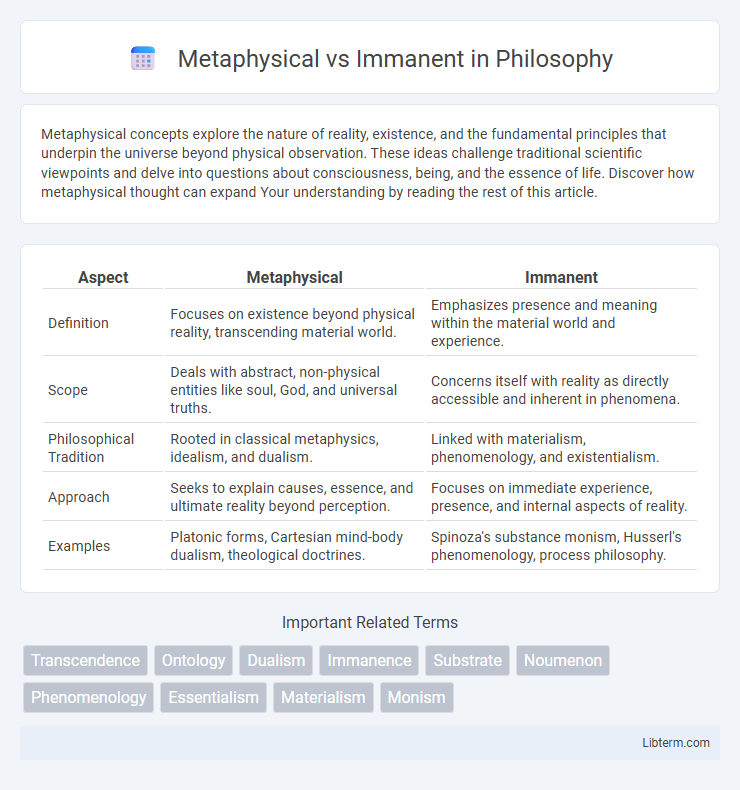Metaphysical concepts explore the nature of reality, existence, and the fundamental principles that underpin the universe beyond physical observation. These ideas challenge traditional scientific viewpoints and delve into questions about consciousness, being, and the essence of life. Discover how metaphysical thought can expand Your understanding by reading the rest of this article.
Table of Comparison
| Aspect | Metaphysical | Immanent |
|---|---|---|
| Definition | Focuses on existence beyond physical reality, transcending material world. | Emphasizes presence and meaning within the material world and experience. |
| Scope | Deals with abstract, non-physical entities like soul, God, and universal truths. | Concerns itself with reality as directly accessible and inherent in phenomena. |
| Philosophical Tradition | Rooted in classical metaphysics, idealism, and dualism. | Linked with materialism, phenomenology, and existentialism. |
| Approach | Seeks to explain causes, essence, and ultimate reality beyond perception. | Focuses on immediate experience, presence, and internal aspects of reality. |
| Examples | Platonic forms, Cartesian mind-body dualism, theological doctrines. | Spinoza's substance monism, Husserl's phenomenology, process philosophy. |
Defining Metaphysical and Immanent Concepts
Metaphysical concepts pertain to the fundamental nature of reality beyond physical experience, addressing abstract entities such as existence, causality, and the nature of being. Immanent concepts emphasize the presence and operation of these realities within the material world, focusing on how spiritual or abstract principles are inherent and continuously manifest in physical phenomena. Defining metaphysical and immanent ideas involves understanding metaphysics as transcendent and beyond sensory perception, whereas immanence relates to presence within and inseparability from the physical universe.
Historical Roots of Metaphysical Thought
Metaphysical thought originated in ancient Greek philosophy, primarily with Aristotle, who distinguished between substance and essence, laying the groundwork for questions about existence beyond physical reality. This tradition contrasts with immanent perspectives that emphasize the divine or ultimate reality as inherent within the natural world, rather than transcendent. Key historical figures such as Plato influenced metaphysics by positing the existence of transcendent Forms, shaping centuries of philosophical inquiry into being and reality.
The Rise of Immanent Philosophy
Immanent philosophy centers on the belief that reality and divinity exist within the material world, contrasting with metaphysical views that locate existence beyond sensory experience. The rise of immanent philosophy gained momentum during the 20th century as thinkers like Spinoza and Deleuze emphasized interconnectedness and self-contained systems in nature. This shift influenced contemporary discussions on ontology, ethics, and spirituality, prioritizing tangible experiences over abstract transcendence.
Key Differences Between Metaphysical and Immanent Perspectives
Metaphysical perspectives assert that reality exists beyond the physical world, emphasizing abstract principles or entities independent of sensory experience, whereas immanent perspectives hold that the divine or ultimate reality is inherent within the material world and accessible through direct experience. Key differences include metaphysics positing transcendence beyond empirical phenomena, while immanence rejects transcendence, asserting presence within the natural world itself. Understanding these distinctions clarifies debates in philosophy, theology, and spirituality regarding the nature of existence and the locus of ultimate truth.
Metaphysical Worldviews: Beyond Physical Reality
Metaphysical worldviews explore realities that transcend the physical realm, emphasizing abstract concepts such as existence, causality, and the nature of being beyond empirical observation. These perspectives posit that ultimate truths or principles exist outside space and time, often addressing questions about the origin and purpose of the universe. Metaphysics contrasts with immanent frameworks by asserting that reality includes non-physical dimensions that influence or underlie material existence.
Immanence: Presence Within the Physical World
Immanence refers to the inherent presence of the divine or spiritual essence within the physical world, contrasting with metaphysical notions of transcendence beyond material existence. This concept emphasizes that all aspects of reality, including nature, consciousness, and life itself, are imbued with intrinsic sacredness and interconnectedness. Philosophical traditions such as Spinoza's pantheism and process theology strongly advocate immanence, asserting that the divine operates internally rather than externally or apart from the cosmos.
Famous Philosophers: Metaphysics vs Immanence
Famous philosophers such as Aristotle and Plato have significantly influenced metaphysical thought, emphasizing the existence of reality beyond the physical realm, known as transcendent metaphysics. In contrast, thinkers like Spinoza and Deleuze championed immanence, asserting that reality and knowledge are contained within the material world itself, without recourse to supernatural explanations. The debate between metaphysics and immanence centers on whether ultimate truth lies beyond or within the observable universe, shaping foundational perspectives in ontology and epistemology.
Implications for Spirituality and Religion
Metaphysical concepts often emphasize transcendence beyond the physical world, supporting spiritual practices that seek connections with a divine or ultimate reality, influencing religions to focus on an otherworldly realm. Immanent perspectives highlight the divine presence within the material world and human experience, promoting spirituality grounded in personal growth, interconnectedness, and ethical living. These contrasting views impact religious doctrines, rituals, and interpretations of sacred texts, shaping believers' understanding of the divine and their path to spiritual fulfillment.
Metaphysical vs Immanent Ethics and Morality
Metaphysical ethics bases morality on transcendent principles or divine commands existing beyond human experience, emphasizing universal truths independent of material reality. Immanent ethics grounds morality in tangible, lived experiences and social contexts, asserting that moral values arise from human consciousness and relationships within the natural world. The tension between metaphysical and immanent ethics lies in whether moral authority is external and absolute or internal and evolving with human existence.
Contemporary Debates: Which Perspective Prevails?
Contemporary debates on metaphysical versus immanent perspectives focus on the extent to which reality transcends or is contained within the natural world. Philosophers like Alain Badiou argue for a metaphysical foundation underpinning universal truths, while figures such as Graham Harman emphasize immanence through object-oriented ontology, advocating for an understanding of entities existing independently of human perception. The prevailing view often depends on disciplinary contexts, with metaphysical frameworks dominating theology and classical philosophy, whereas immanent approaches gain traction in contemporary continental philosophy and new materialism.
Metaphysical Infographic

 libterm.com
libterm.com